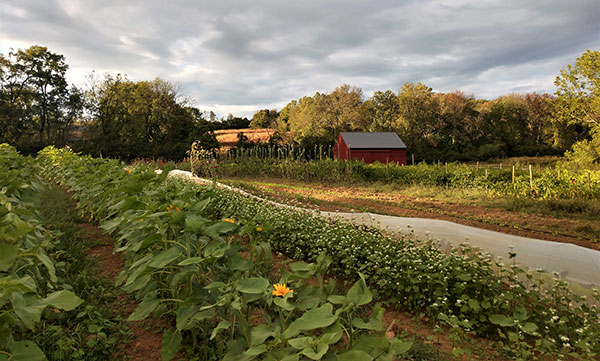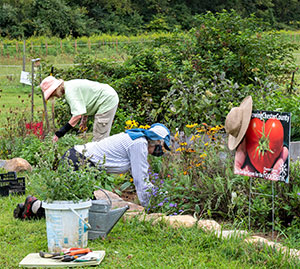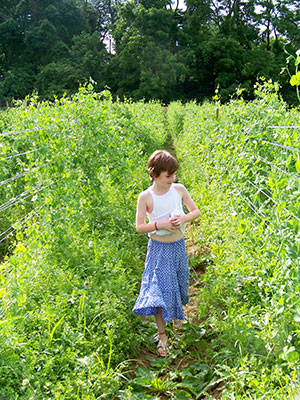
Chester County Ag Council
Home | Farm Guide | 2021 Farm Guide Feature
A feature from the 2021 Farm Prodcuts Guide.

"We want people to truly understand the value of conserving land for agriculture," says Fred de Long, the Director of Willistown Conservation Trust's Rushton Farm Program.
Willistown Conservation Trust (WCT) is a non-profit land trust working to protect open land in the 28,000 acres surrounding Willistown, Pa. Their holistic approach to conservation explores the connections among land, birds, habitat, farm and water.
It's also home to Rushton Farm, a diverse, six acre produce operation that yields 30,000 pounds of food a year for the farm's CSA (community supported agriculture) program members and for two local food cupboards.
How did this productive farm enterprise come to be such an integral part of a land trust devoted to environmental stewardship and conservation?
In 2007, a conversation that had been brewing among Willistown staff and board members about honoring the land's rich agricultural history came to a head. The Trust would pilot a diverse, environmentally sensitive farm next to Rushton Woods Preserve to show that conserved land can be used for productive farming, as it had been for centuries prior.

It was the Trust's first project to use protected land for a purpose beyond its recreational value and benefit to wildlife, but it took a lot of convincing to get everyone on board.
De Long remembers having to work with the WCT board and staff to convince everyone that the idea would not only work, but would be beneficial for the Trust and the land entrusted to them to steward. While many staff and board members strongly supported establishing a farm that could be representative of how regenerative agriculture could work in concert with the surrounding ecosystem, some had reservations about the Trust's capacity to manage this new project.
Fellow staff member Lisa Kiziuk had supported establishing a farm on conserved land but had some reservations about the impact on the resident and migratory bird population.
"I have a clear memory early on in the development of Rushton Farm about discussing with Lisa whether or not agricultural land would negatively impact the bird population," recalls de Long.

A $102k grant from the state in 2007 to break ground plus a smaller grant from the Delaware Valley Ornithological Club to start a bird banding station to study the effect of farming on migrating birds made the proposed project an easier sell.
Once the farm was up and running, de Long and the rest of the Trust were delighted to see that the organic and regenerative farming practices they use supports a diverse bird population.
"Diversity is the most important thing," says de Long. "We grow 140 varieties of fruits and vegetables on the farm and we ensure that there are plenty of native plants around our field borders to provide extra habitat and food supply," says de Long.
The farm's thriving CSA program now has an approximately 10 year waiting list to join.
"It's all about agro-ecology, how agriculture and the ecosystem work together," he adds.
As a result of the work happening on Rushton Farm, Willistown Conservation Trust is now nationally recognized as a strong example of the benefits of work in the study of agroecology (farming with nature in mind).
Rushton Farm not only helps support bird populations and important native pollinators, but it has drawn new human visitors, too.
"It gives us an opportunity to engage people — over the food we grow, as a place to talk to farmers about what we are doing on the land, as a quiet place to watch birds and even as a community meeting place," says de Long.
Rushton Farm is part of the Rushton Woods Preserve and Farm located at 911 Delchester Road, Newtown Square. It is open 7 days a week for visitors to visit the farm and surrounding nature preserve, www.wctrust.org.
The property has also become a living laboratory for students of all ages through the Trust's "Rushton 360" and "Food and Feathers" programs. Student groups and land trust staff and board members are encouraged to visit the farm, see bird banding in action and eat lunch made from produce grown on the property in their daylong workshops.
Several rounds of University of Pennsylvania graduate students have spent time on the farm studying the number of native bees and cataloging plant life for their capstone projects. Kiziuk, with assistance from de Long, teach university courses in environmental science based on their Rushton Farm experiences.
"People who have worked with or visited Rushton become our ambassadors for the environment wherever they go," says de Long. "It has become so much bigger than just Rushton Farm."